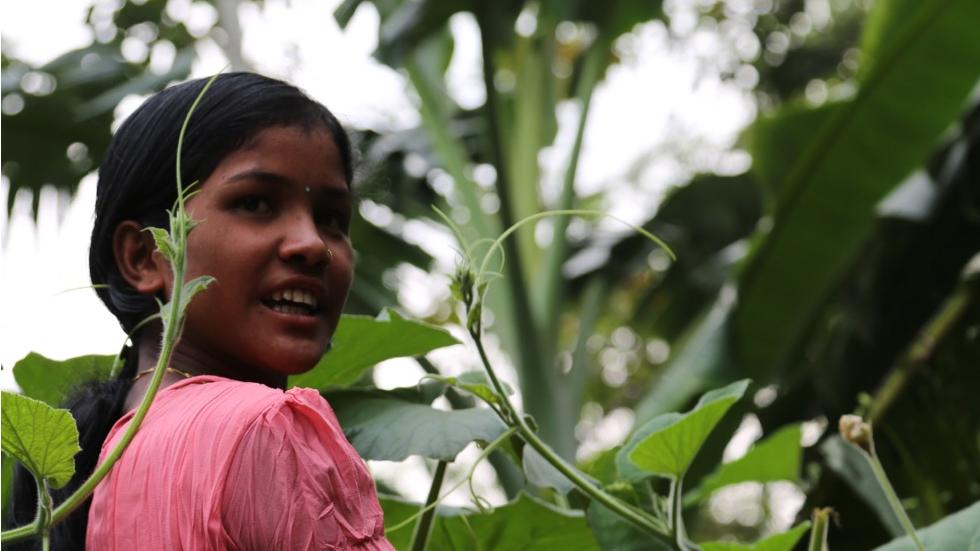Who knew a gourd could unlock a better future for rural Indian girls
“After My Garden Grows” documents the story of Monika Barman, a rural Indian teenager growing food on her tiny rooftop garden.
Monika Barman is a teenager in rural India. She grows vegetables on a tiny rooftop garden and sells them at a nearby market. It’s nothing extraordinary. But her small plot is part of something larger.
And that’s what Megan Mylan covers in, "After My Garden Grows." The Academy Award winner shows us Barman's life. The teenager is part of a program launched by the West Bengal government and the nonprofit Landesa that teaches basic farming methods to some 40,000 girls in the area. The goals are simple: reduce child marriage, keep the girls in school longer and help them eat better. And farming is the key to reaching those goals.
To understand, you need to be familiar with the region of the world where Barman lives. While gorgeous, Mylan says, it’s also a place one can get stuck.
“The families living there are dealing with the whole ball of wax of poverty, landlessness and poor nutrition. And, particularly for girls, the added issues of access to education and child marriage,” she says. “There’s a lot going on as these families struggle to survive.”
Mylan shows the girls’ frustration in her film. On one hand, the girls are becoming aware of their rights. They know their legal rights when it comes to marriage. They know they have a right to stay in school. And they know they have the right to inherit land.
On the other hand, it’s hard to break traditions. So many girls marry at a young age, drop out early and lose their inheritance.
That's where the garden comes in.
“It’s not an obvious thing,” she says. “Why would taking a gourd to market change your future?”
Mylan says girls are often seen as a burden. She says there is a belief that giving daughters to another family relieves the parents of a burden, and guarantees the daughters a secure future. “That’s the hope,” she says.
And there’s also the dowry. The older the girl, the more it costs to marry her off. And if families wait long, Mylan says, the dowry can bankrupt a family.
But what can happen with just a tiny sale of a gourd is huge. Mylan says the girls make just enough money that they might be able to pay their school fees. She says the fathers often feel like these small amounts of money allow them to risk delaying marriage.
“And that’s everything,” she says. “You give a girl a couple more years of education and everything changes.”
The film is only ten minutes long. Monika’s future is still uncertain. But her garden continues to grow.
Monika Barman is a teenager in rural India. She grows vegetables on a tiny rooftop garden and sells them at a nearby market. It’s nothing extraordinary. But her small plot is part of something larger.
And that’s what Megan Mylan covers in, "After My Garden Grows." The Academy Award winner shows us Barman's life. The teenager is part of a program launched by the West Bengal government and the nonprofit Landesa that teaches basic farming methods to some 40,000 girls in the area. The goals are simple: reduce child marriage, keep the girls in school longer and help them eat better. And farming is the key to reaching those goals.
To understand, you need to be familiar with the region of the world where Barman lives. While gorgeous, Mylan says, it’s also a place one can get stuck.
“The families living there are dealing with the whole ball of wax of poverty, landlessness and poor nutrition. And, particularly for girls, the added issues of access to education and child marriage,” she says. “There’s a lot going on as these families struggle to survive.”
Mylan shows the girls’ frustration in her film. On one hand, the girls are becoming aware of their rights. They know their legal rights when it comes to marriage. They know they have a right to stay in school. And they know they have the right to inherit land.
On the other hand, it’s hard to break traditions. So many girls marry at a young age, drop out early and lose their inheritance.
That's where the garden comes in.
“It’s not an obvious thing,” she says. “Why would taking a gourd to market change your future?”
Mylan says girls are often seen as a burden. She says there is a belief that giving daughters to another family relieves the parents of a burden, and guarantees the daughters a secure future. “That’s the hope,” she says.
And there’s also the dowry. The older the girl, the more it costs to marry her off. And if families wait long, Mylan says, the dowry can bankrupt a family.
But what can happen with just a tiny sale of a gourd is huge. Mylan says the girls make just enough money that they might be able to pay their school fees. She says the fathers often feel like these small amounts of money allow them to risk delaying marriage.
“And that’s everything,” she says. “You give a girl a couple more years of education and everything changes.”
The film is only ten minutes long. Monika’s future is still uncertain. But her garden continues to grow.
The story you just read is accessible and free to all because thousands of listeners and readers contribute to our nonprofit newsroom. We go deep to bring you the human-centered international reporting that you know you can trust. To do this work and to do it well, we rely on the support of our listeners. If you appreciated our coverage this year, if there was a story that made you pause or a song that moved you, would you consider making a gift to sustain our work through 2024 and beyond?
